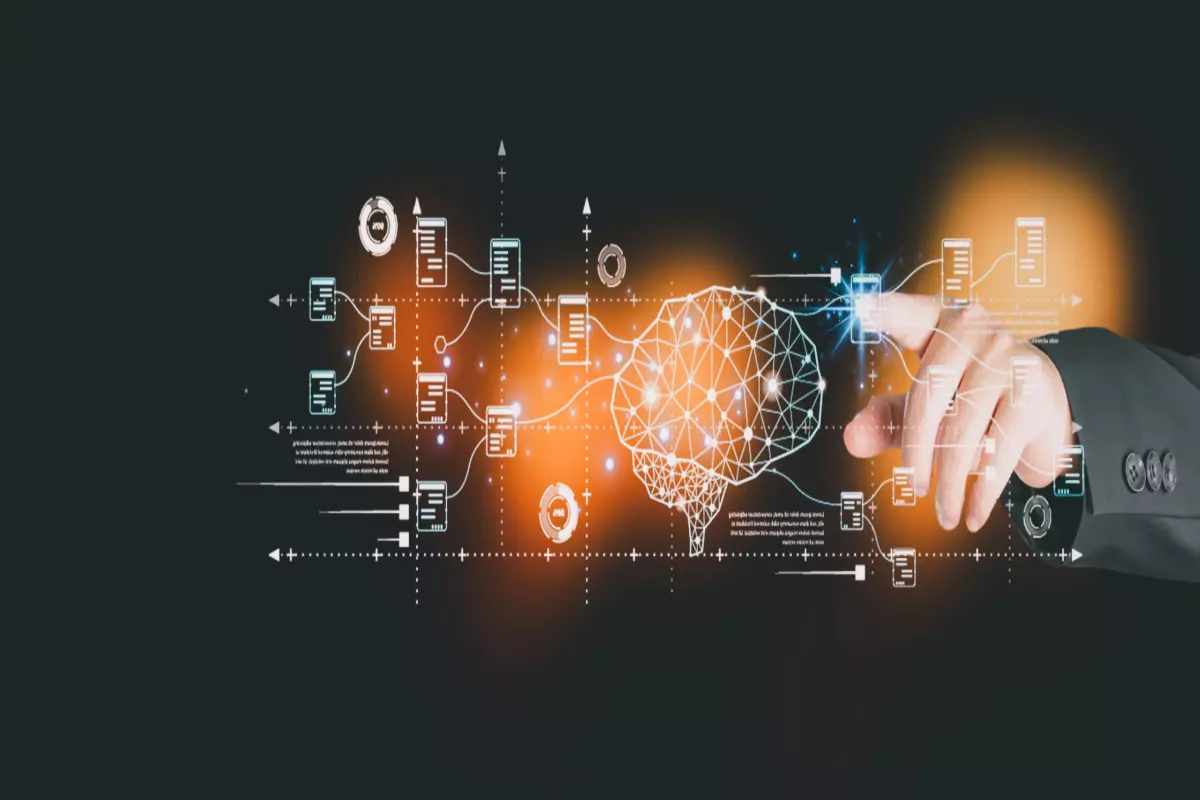Best Ways to Use AI for Lead Generation
In the dynamic business world, staying ahead means embracing the latest technological advancements. One of the most prominent advancements is AI lead generation. In a world where 40% of sales teams have seen progress utilizing AI for lead generation, the advent of artificial intelligence in this domain is revolutionizing how companies approach potential customers.
But why is this sought-after by businesses, and where does AI step in? It is because, in customer engagement and sales strategies, AI stands out as a beacon of efficiency and precision. According to a McKinsey Global Survey, “AI-related revenue increases are most often reported in product development and marketing and sales. Among respondents, 41% report at least 5% revenue growth, 9% witness a 10% revenue increase, and 21% report a 10% cost decrease.”

Join us as we unravel the practice of lead generation using AI. We offer not only a deep understanding of AI’s role in lead generation but also a toolkit of innovative, data-driven approaches ready to be implemented in your business strategy.
Understanding AI in Lead Generation
AI’s role in lead generation begins with its unparalleled ability to analyze vast amounts of data. This isn’t just about crunching numbers; it’s about discerning patterns and preferences in customer behavior, market trends, and engagement metrics. For example, AI can examine a customer’s interaction with a website and determine the likelihood of a purchase.
Then comes the aspect of predictive analytics, a cornerstone of AI’s functionality. Predictive lead scoring is a method that uses AI algorithms that go beyond traditional scoring systems. It not only evaluates a lead’s current engagement level but also forecasts future actions. This forecast allows businesses to prioritize AI leads with the highest conversion potential, optimizing sales efforts and resources.
Personalization is another key feature of AI that takes customer engagement to new heights. AI systems analyze individual customer data to deliver personalized messages and offers, enhancing customer experience and boosting conversion rates.
In a nutshell, AI is a tool that enhances current marketing strategies and opens new avenues for customer engagement and business growth. As AI continues to evolve, its integration into lead generation is becoming a necessity for staying competitive in an increasingly digital marketplace.
Top 10 Ways to Use AI for Lead Generation
With its unparalleled ability to sift through data, predict trends, and personalize interaction, AI in marketing is redefining the boundaries of sales strategies. With that said, here are 10 ways to effectively use AI for lead generation:
Gathering and Utilizing Marketing Data for AI Enhancement
In the realm of AI lead generation, the power lies in the intelligent harnessing of marketing data. By aggregating and analyzing information from diverse sources like website interactions, social media, and customer feedback, AI algorithms unearth patterns and predict customer behaviors, driving more effective marketing strategies.
This approach enhances the overall customer experience, as seen in Amazon’s AI-driven recommendations, which contributes significantly to sales. Moreover, AI’s predictive analytics optimize resource allocation by directing efforts and funds towards strategies proven to yield higher engagement and conversion. Moreover, 79% of top marketing executives report a growth in return on investment (ROI) after using AI.
Another study by McKinsey & Company showed that businesses using AI for customer segmentation, which analyzes customer data to create highly targeted marketing groups, reported up to a 50% increase in customer satisfaction rates.
Employing AI for Enhanced Prospect Identification
AI algorithms excel at analyzing complex datasets to identify potential customers who are most likely to engage with a business’s services or products. This process involves scrutinizing various data points such as consumer behavior, demographic information, online activity, and even purchasing history.
For instance, AI can enhance prospect identification by analyzing patterns in existing customer data to find potential customers with similar behaviors, leading to more targeted and efficient lead-generation efforts. This focused approach improves sales productivity because resources are directed toward engaging prospects who are more likely to convert. Moreover, a study by the Harvard Business Review found that companies using AI for sales and marketing were able to increase their leads by more than 50%.
The beauty of AI in this domain lies in its scalability and adaptability. As more data becomes available, AI systems continuously learn and improve, ensuring that the process of prospect identification becomes more refined and accurate over time.
Streamlining the Lead Scoring Process with AI Algorithms
AI takes lead scoring beyond the realms of conventional methods by integrating advanced analytics and machine learning. This approach enables businesses to score leads based on various nuanced factors, including engagement patterns, likelihood to purchase, and potential lifetime value.
Traditionally, lead scoring was often a manual process based on a set of predefined criteria. However, AI changes the game by constantly learning and adapting its scoring criteria based on real-time data. This means the scoring system becomes increasingly accurate and effective in each lead’s true potential.
A study by Forrester found that AI-driven lead scoring can improve alignment between marketing and sales by 50%. This improvement ensures that sales teams are working on leads that are most likely to convert, thereby increasing overall efficiency and conversion rates.
Furthermore, AI-driven lead scoring personalizes the sales process. By understanding the unique characteristics and needs of each lead, sales teams can tailor their approach, increasing the chances of successful engagement.
Integrating AI Chatbots in the Customer Purchase Journey
Chatbots, powered by sophisticated AI algorithms, can handle a range of tasks from initial customer engagement to closing sales, significantly enhancing the customer experience. They provide timely, personalized responses to customer inquiries, maintaining engagement and interest throughout the purchase journey.
AI chatbots are programmed to learn from each interaction, which allows them to deliver more relevant and accurate information on potential leads over time. Salesforce reports that businesses using AI chatbots have seen a 25% increase in sales conversion rates.
In addition to improving sales conversions, AI chatbots also play a role in gathering data. They can track customer preferences, behavior, and feedback, which can be used to refine marketing and sales strategies further. This level of insight is invaluable in creating a more personalized and effective customer journey.
Delivering Tailored Services Using AI
Delivering personalized services through AI is not just about addressing the customer by name; it’s about understanding their preferences, behaviors, and needs to offer customized solutions. AI achieves this by analyzing a wealth of data points from various customer interactions, such as past purchases, browsing history, and social media activity. AI sifts through this data to create detailed customer profiles to help businesses tailor their services and communication to meet the unique needs of each customer.
One notable example of AI-driven personalization is Netflix’s recommendation system. It analyzes viewer histories to suggest shows and movies, enhancing the user experience. This level of personalization not only keeps customers engaged but also contributes to increased retention rates. Research shows that 91% of consumers are more likely to shop with brands that provide relevant and customized offers and recommendations.
Automating Email Campaigns with AI for Lead Attraction
AI revolutionizes email marketing by personalized content, optimizing send times, and segmenting audiences, ensuring each email is tailored to each recipient’s interests and behaviors. AI algorithms analyze past interactions and engagement data to determine the most effective content for different audiences. Campaigns using such targeted personalization have been shown to increase email open rates and click-through rates significantly.
Moreover, AI optimizes the timing of email campaigns. By analyzing when recipients are most likely to open and engage with emails, AI ensures that messages are sent at the most opportune moments. This results in higher engagement rates – emails sent during the recipient’s local time zone’s optimal window saw a 20% increase in open rates.
But ultimately, automating email campaigns with AI is not just about sending out large volumes of emails. It’s a sophisticated approach to ensure each communication is relevant, timely, and personalized, which significantly increases the chances of converting recipients into leads.
Enhancing Lead Segmentation Through AI
AI algorithms excel in dissecting vast arrays of customer data, identifying subtle patterns and behaviors that traditional analysis methods might miss. This capability allows businesses to segment their audience into more specific groups based on purchasing habits, browsing history, demographic details, and engagement levels. Through this segmentation, companies can tailor their marketing messages and offers to meet the specific needs and preferences of each group.
Additionally, AI segmentation helps allocate marketing resources more efficiently, ensuring that efforts are focused on the most receptive and valuable customer groups. For instance, a retail company could use AI to identify high-value customers who frequently make purchases and target them with exclusive offers to convert them into leads while simultaneously crafting different strategies for engaging new shoppers.
Advancing Predictive Analytics for Superior Lead Generation
Predictive analytics utilizes AI algorithms to analyze historical and current data to predict future outcomes. In the context of AI lead generation, it means foreseeing which leads are more likely to convert, thereby enabling businesses to focus their efforts and resources more effectively.

In advancing predictive analytics for lead generation, AI delves into various factors of past successful conversions, such as customer demographics, engagement metrics, purchase history, and behavior patterns. By analyzing these elements, predictive analytics gauges the likelihood of future conversions, focusing on prospects with profiles that closely match those of previous successful customers.
Predictive analytics can also identify potential risks in the sales pipeline, such as leads that might not be profitable or segments that are less likely to engage. This early identification helps businesses adjust their strategies proactively, avoiding costly missteps. And as predictive analytics technology continues to advance, its role in shaping effective and innovative lead-generation strategies is likely to grow further.
Learning from Historical Data With AI
AI’s ability to analyze past trends and patterns in data is particularly valuable for companies to refine their targeting and personalization strategies, leading to higher engagement and conversion rates. By analyzing historical purchase data, an e-commerce company can identify products frequently bought together, guiding cross-selling strategies and personalized recommendations.
Furthermore, AI’s analysis of historical data assists in improving forecasting and planning. Businesses can use AI to anticipate future trends and customer needs, staying ahead of the competition. Refining lead scoring models is another significant benefit of learning from historical data with AI. By analyzing past interactions and conversions, AI can make lead-scoring models more accurate, effectively identifying high-quality leads.
Salesforce’s report indicates that high-performing marketing teams that utilize AI in their strategies, including analyzing historical data, are more likely to achieve better decision-making. Gartner’s research further supports this, suggesting that businesses integrating AI in their operations can expect a notable increase in profitability.
Improving Sales Pipeline Quality with AI-Driven CRM
AI-driven customer relationship management (CRM) systems enhance lead qualification by using sophisticated algorithms to sift through and analyze lead data, effectively pinpointing the most promising leads. This targeted approach ensures that sales efforts are concentrated on leads with the highest conversion potential, optimizing resource allocation.
In addition to lead qualification, these AI-enhanced systems provide predictive sales insights. They analyze historical data to forecast future market trends and customer needs, enabling sales teams to plan and strategize more effectively.
Moreover, AI-driven CRM systems streamline the sales process by automating online tasks such as data entry. This automation not only frees up time for sales teams to focus on more strategic activities but also ensures that customer data is analyzed more efficiently. Furthermore, AI in CRM improves customer engagement by tracking interactions and advising on the best times and methods for follow-up.
Conclusion
As we conclude our exploration of AI in lead generation, it’s clear that AI is not just a technological advancement; it’s a strategic ally in the marketing world. The journey from harnessing data for AI enhancement to leveraging predictive analytics underscores AI’s transformative role in identifying, engaging, and converting leads.
The key takeaway is that AI empowers businesses to make data-driven decisions, tailor customer experiences, and stay ahead in a competitive landscape. With AI, the future of lead generation is smarter, more efficient, and continually evolving, promising new opportunities for growth and success in the digital marketplace.
Try our real-time predictive modeling engine and create your first custom model in five minutes – no coding necessary!
- Fully operational AI with automated model building and deployment
- Data preprocessing and analysis tools
- Custom modeling solutions
- Actionable analytics
- A personalized approach to real-time decision making
Table of Contents
- Understanding AI in Lead Generation
- Top 10 Ways to Use AI for Lead Generation
- Gathering and Utilizing Marketing Data for AI Enhancement
- Employing AI for Enhanced Prospect Identification
- Streamlining the Lead Scoring Process with AI Algorithms
- Integrating AI Chatbots in the Customer Purchase Journey
- Delivering Tailored Services Using AI
- Automating Email Campaigns with AI for Lead Attraction
- Enhancing Lead Segmentation Through AI
- Advancing Predictive Analytics for Superior Lead Generation
- Learning from Historical Data With AI
- Improving Sales Pipeline Quality with AI-Driven CRM
- Conclusion



